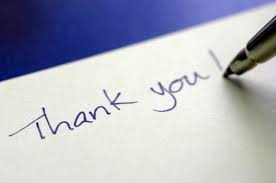I am a big proponent of
sending thank you notes after an interview.
However, sometimes it is better not to write a thank you note at all
than to send a badly worded, misspelled or poorly thought out one. Those things can kill an offer.
Many people misunderstand
the purpose of a thank you note. It is a
polite way to communicate interest in a job.
It should thank the interviewer for his or her time and it should ask
for the job. But it should not be a
selling document, per se.
The interview itself was
for selling.
I believe that a note
should be short and sweet, “Dear So And So, I really enjoyed meeting you and
thought we could work together well. I
would very much like this job and look forward to next steps.” Period.
Nothing more.
The only time more should
be written is if the writer feels something was either left out of the
interview or if more information has been uncovered (e.g. I just came across
this article in the New York Times
over the weekend and wanted to pass it on to you in case you missed it.).
The one thing which a
thank you note must be is short. As William Shakespeare wrote, “Brevity is the soul of wit.”

That is why a hand written note is still appropriate. And today they are so rare that a hand written note may well be remembered.
That is why a hand written note is still appropriate. And today they are so rare that a hand written note may well be remembered.
I recently had a candidate who literally over-wrote his notes to the several people he had met while interviewing. His thank you notes to each were long and redundant. He sent me copies and I cringed because each note was five or six long paragraphs, possibly longer than a normal 8.5” x 11” page. I knew without reading that they were way too long. As another recruiter put it, it wasn’t so much a thank you note, but, rather, a thank you essay. He explained in detail why he thought he would work well with the person to whom it was sent; then he went on to sell himself - for several paragraphs. Unfortunately, these notes just reconfirmed the agency’s thoughts about the candidate - he talked too much. (I subsequently learned that most of the people he sent them to did not bother to read the entire email.). While his candidacy was already pretty much dead, these notes put the nails in the coffin, so to speak.
Over the years I have had
many candidates who were doing well on interviews and
then the interviewing simply stopped and the process came to a screeching halt with no explanation. Subsequently, I learned that he or she sent a
bad thank you note with typos or misspellings or badly constructed sentences. (For
unknown reasons, some HR people and hiring managers are reluctant to tell me about this. I
have never quite understood why they did not want to share this information with a recruiter – I, too, would
reject them. Knowing this is important
feedback.)
People have a tendency to
get wrapped up in the message and forget about the form. A thank you note, not unlike a résumé, is
also an ad for the sender. The form has to be neat and smart. The message is a
total reflection of the sender.
